Quit What —
I’m not sure what to rate this, as we don’t have a “Fat Semantics” tag. After reading this post on Big Fat Blog about people who refer to fatties as “the obese,” I’ve felt compelled to comment on the terminology.
I know this will come as no surprise to people who think I’m a crypto-fat hater, but I still use the term “obese” in certain contexts. I haven’t combed back through my writing to verify the accuracy of what I’m about to say, but based on my feelings about the word, I think I’m being truthful.
I use “obese” strictly when discussing or debating issues of obesity with mainstream viewpoints. I don’t use it to refer to all fat people, I use it in its strictly clinical sense: obesity is a person with a BMI of 30 and above. I use the term “morbidly obese” when referring to a person with a BMI of 40 and above. I use the term “normal” (which, of all the terms, is the one that makes me the most uncomfortable) when referring to a person with a BMI of 18.5–25.
Now, why in the hell would I want to use such loaded terms when I’m supposed to be working toward equality, social acceptance, and body positivity? And most especially when I think BMI is a load of horse shit?
The primary reason is that if you want to discuss the research that is out there, you’re going to have to get used to the term “obese.” Yeah, the word itself has terrible connotations, but connotation is a function of public perception.
If I could work the kinks out of my magic FA wand, this world wouldn’t harbor such hatred and contempt for fat people. In which case, obese would just be another word for fat, as it’s etymology suggests.
But in our current environment, fat is bad enough, but obese is the kiss of death. A fat person is gross, but an obese person is gross and on the verge of physical collapse. “Obese” implies all the worst attributes of “fat,” and then some. If you’re obese, you are gluttony and sloth personified. If you are obese, you are a problem to be solved.
But wave my magic FA wand and make “obese” disappear. What would take its place? Superfat? Corpulent? Porcine?
It’s not the word that is bad, it’s the social value attached to the word.
As you can tell, I’m not a big believer in “bad” words, only bad intent. When I refer to “obese” people, I’m referring to a statistical segment of our society who fall within this arbitrary height/weight classification. What other option is there when discussing a study on the mortality rates of obesity?
When I try to explain to people that the greatest change in weight over the past 30 years has been among those with a BMI over 40, does it matter how I refer to them? If I refer to them as people with a BMI over 40 is that any better than referring to someone as morbidly obese? Because when discussing this issue in comments or message boards, I refer to BMI, as opposed to “morbid obesity” because not everyone knows that “morbidy obesity” refers to a specific, quantifiable group.
Whether I refer to that group as “morbidly obese” or as having a BMI over 40, it’s still segmenting a portion of the population. But the intent is not to isolate or segregate them. It is to use the data, use the research, in order to educate on the fallacy of fat health concerns.
The morbidly obese (see, I did it again) make up a very small segment of the population (just 3%), yet the diseases that are most highly correlated with a BMI over 40 are also attributed to those who are obese or fat.
To me, that means that, if anything, we need to be MORE stringent in our application of the terms “overweight,” “obese,” and “morbidly obese.” Currently, every story we hear about obesity seems to indicate that two-thirds of the nation are overweight, and therefore we have a problem. People hear “overweight” and they think “obese.” They think headless fatties. They think ginormous people lumbering about, threatening their very existence.
If anything, we seem to have a problem, as a nation, of understanding that people who are overweight are living longer and are as healthy (if not healthier) than “normal” people. And even those who are obese aren’t showing the debilitating health issues that plague the headlines.
So, when discussing the issues of fat health and fat science, I do use the term “obese” and even “the obese” because when you’re talking about science and health (from a clinical point of view) you aren’t referring to humanity. You’re referring to statistics and trends.
Again, intent.
But when I talk about fat rights or fat acceptance, I do not refer to “the obese” because in that instance I am specifically talking about humanity.
I know this parsing is going to get me into trouble, so let me see if I can clarify.
When talking about statistics and trends, I’m talking in terms of numbers and data, not people. People make up those numbers and data, but I cannot take that data and apply it to you as a person. I can simply observe you as a person, see where you fall in terms of the particular issue and compare to the existing data.
Statistics are, by their nature, a dehumanizing process.
But when I talk about individual rights, individual dignity, I’m not comparing real “me” versus statistical “me.” I’m talking about issues that affect all of us, regardless of where we fall on the statistical sheets. Healthy, unhealthy, doesn’t matter. I deserve dignity, respect and personal freedom no matter what.
If in that context I referred to you as “obese,” then I would be dehumanizing you in what should be a humane issue. Does that make sense or am I totally off the rails here?
I’m curious what you all think. Are there times when “obesity” is an okay term or is it always off limits? Can you distinguish between the dehumanizing intent versus clinical detachment? How does the term strike you?








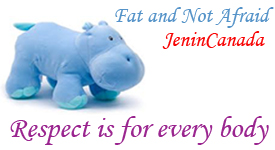

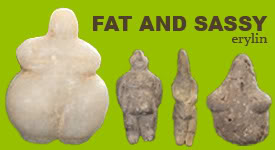
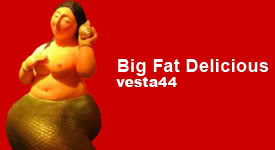




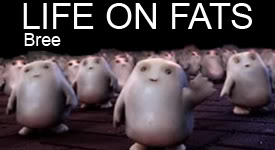



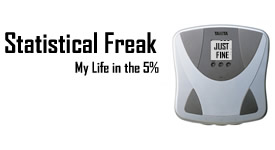


I think that the word obese has been taken out of its own context, which, as you say, is a clinical definition of a certain group of people between x and y height and weight, and been politicized to refer to anyone who’s carrying around 10 pounds more than charts tell them they “should”
It’s why the “OBESITY EPIDEMIC” is in all the headlines rather than the “SOME PEOPLE ARE CARRYING 10 POUNDS MORE THAN THE CHARTS TELL THEM THEY SHOULD EPIDEMIC”
Scary sells - you gotta make it sound scary.
So many people don’t even understand what the clinical definition of obese is, though… they don’t realize it’s so very much like what they look around and consider “normal”.
I worked with a lady once who went to her doctor and was told she HAD TO LOSE WEIGHT OR DIE!!! Because she was 10 POUNDS AWAY FROM OBESITY!!!!
Everyone in the office was totally floored, because, you know, she just looks like everyone else - just a person of average size.
People don’t understand what “obese” means, really. They picture the 1000 pound man they saw on TV, not their 180 pound cube mate.
So when they hear that EVERYONE IS OBESE!!! That’s what they think is coming to get them - ooga booga.
I have no solutions on how to fix that. But banning the word obesity (did you read the article about Liverpool?) is not going to fix it - because another word will just be applied in its place.
I did not read about the Liverpool article. Now I’m going to have to find it.
And I’m right with you… you can’t get rid of “obesity” without some other word replacing it. If anything, we need to make this word MORE clinical and less subjective.
Peace,
Shannon
I once had someone pinch the upper arm of my three year old and tell me he was at risk for obesity. When a giant cartoon question mark popped up over my head prior to my fists starting to move toward his jaw, he explained that he could “pinch more than an inch”.
Then I realized he was just bat shit crazy and I should probably not waste my fight club energy.
I don’t think many people have a clear idea of when to use a term like obesity. They seem to like the sound of it and it does carry a nice alarmist appeal so they jump on the bandwagon.
Ya know, I probably would have punched him anyway. Random people issuing medical advice? Totally inappropriate, regardless of the issue.
And the whole BMI BS thing is even worse when applied to children. I’m telling you, they’re going to do more damage trying to “fix” fat kids than they would if they just left well enough alone.
Peace,
Shannon
I’m not sure if she was really this clueless or just trying to spare my delicate fat feelings, but my doctor warned me that I was getting close to being obese (whispering the word like it was dirty). I looked right at her and said, “You mean I’m close to being MORBIDLY obese, right? I’ve been obese my entire adult life, even at my lowest weight.” My BMI was almost 40. Hello? And despite this fact, I am a real live active person who is happy in pretty good shape, physically.
The numbers and terms make sense statistically, but not when applied to the individual (like this post explains). As an individual, BMI is just one piece of the data and a not-so-accurate one at that. With respect to the words used to describe fat people, it’s a tough call. But when debating, it’s helpful to use a common set of terms that are clearly defined so I think we’re stuck with obesity for now. Do I like being called or labeled “morbidly obese”. Uh, no. It’s a crappy way to describe anything about my health. At the same time, I think it is helpful to put myself out there and give a face to what people are talking about when they make blanket statements about this mythical 3% of the population.
I have an interview in the can with Dr. Steven Blair (the fat and fit researcher) who told me that half the people who are obese are completely healthy according to their fitness standards (cardiorespiratory health). HALF! HALF OF OBESE PEOPLE!
I think that speaks VOLUMES about the importance of not abandoning “obese” as a clinical term, even as we point to the absurdity of BMI and abandon “obese” as a descriptive term. The leading fitness researcher in the nation has found that half the people in the obese BMI category are just fine, fitness-wise. Half the people the nation considers walking timebombs are completely physically fit.
So, yeah, let’s keep pointing out that even people who are “obese” aren’t in danger of keeling over. Instead of loathing the term, we should be redefining it.
And your doctor didn’t know that you were already obese? That seems kind of odd. Are you sure he/she is qualified?
Peace,
Shannon
I don’t have much of a problem with obese being used as a clinical descriptor, where I have a problem is when people say “the obese” like they would say “the blacks”/”the Mexicans”/”the gays”/”the feminists”/etc. Using “the obese” that way takes away fat people’s humanity, it others us and makes us easier to scapegoat and make less than human. It’s easier to blame us for all the ills of society because the blamers don’t have to think of us as actual people with feelings and lives.
Calling fat people “the obese” takes away our agency and makes us a problem to be solved without asking us if we see our fatness as a problem that even needs solving (and would we see it that way if we didn’t have all of society and MSM pushing “thin=healthy” at us 24/7?).
Stop and think about it - how many researchers who are looking for a solution to “obesity” are actually fat? How many doctors who are pushing WLS/diets are fat? How many of the people who own diet companies/pharmaceutical companies who are pushing all these weight loss solutions (that don’t work) are actually fat? They all want to solve a “problem” that they don’t have a clue about what it’s like to live with. And they don’t have a clue because they’ve othered us, taken our humanity away from us, and made us into a problem that doesn’t have a solution and will never have a solution (because you can’t outwit Mother Nature’s designs).
Good point, Shannon. I don’t think she didn’t know I was already obese. I think she was trying to say I was almost in the ‘death fat’ range without saying it as such. She kept pushing the weight loss classes offered at the health center, indicating that my health was in dire jeopardy even though my other indicators were not all that troubling. I tried to tell her a little bit about my disordered past with dieting but she didn’t seem to really want to listen. I did follow up with a HAES oriented email afterwards, just to at least give her a chance to see a difference perspective. I got a pretty noncommittal response, but I did my part.
Vesta44 – Even worse than the fact that most researchers aren’t fat, etc. is that many of us have internalized so much of the anti-fat bias that it doesn’t necessarily matter. Just because someone is fat doesn’t mean he/she hasn’t drunk the cool-aid of our dieting culture. I’d venture to say that most of us are actively trying to fit in (by dieting). That’s why I’m so glad that FA and HAES is getting some press, at least. Before about a year ago, I had NO IDEA there was any other “solution” to my “problem” than trying to lose weight.
There was a comment on one of the lists I belong to that said something to the effect of we need to focus our communications not on the folks who are in the mainstream already, because the moral panic/prejudice has too great a hold on them. The point was also made that folks who have worked their whole life in the field of obesity treatment and reasearch are not going to be mentally willing to acknowledge that they based their life’s work on a set of data that the SA/FA/HAES science is proving is false, erroneous and most importantly biased. She went on the suggest that our efforts need to be focused on the folks just starting out in the fields related to obesity, the university students, the young professionals who have not spent an entire career using the biased information.
With that in mind, I do not think it matters as much what words we use, as I think it is more important to be strategic as to whom we direct our message.
Here is a link to that comment, but you may have to sign up for that Yahoo group for access… http://groups.yahoo.com/group/ASDAH/message/4673